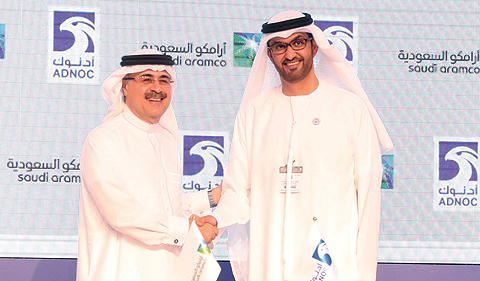 ABU DHABI: Sultan Ahmed Al-Jaber (right), Director General and CEO of Abu Dhabi National Oil Company (ADNOC) shakes hands with Saudi Aramco CEO Amin Nasser after signing a cooperation deal yesterday. — AFP
ABU DHABI: Sultan Ahmed Al-Jaber (right), Director General and CEO of Abu Dhabi National Oil Company (ADNOC) shakes hands with Saudi Aramco CEO Amin Nasser after signing a cooperation deal yesterday. — AFPABU DHABI: Saudi Arabia's energy minister called yesterday for a global output cut of one million barrels per day to re-balance the market, as Riyadh unveiled plans to cut production by 500,000 bpd from December. "The technical analysis we reviewed yesterday shows that we need a reduction approaching one million bpd to balance the market," Khalid Al-Falih told an energy conference in Abu Dhabi. The proposed reduction is from October production levels, Falih said.
Russia, another major producer, struck a more measured tone however, saying it preferred a wait-and-see approach. "I would not want to focus purely on production cuts," Russian Energy Minister Alexander Novak told Bloomberg yesterday. "This is not the ultimate goal, to cut or not to cut," he added. "I think we would have to wait and see how the market is unfolding because our ultimate goal is market stability."
Oil prices have shed a fifth of their value over the past month due to oversupply and signs of a softer-than-expected impact from sanctions on Iranian crude exports. But they climbed yesterday as Riyadh announced plans to cut production in response to fears of oversupply. Falih said Saudi Arabia, the world's largest oil supplier, would cut its production by 500,000 bpd as of next month to help stabilize the market. The 15 members of the Organization of Petroleum Exporting Countries, which include Saudi Arabia, alone pump over a third of global crude supply. Any official decision on global output cuts will be made at a key ministerial meeting for OPEC and non-OPEC producers in Vienna in early December, Falih said.
Oil producers will continue to evaluate the market data prior to the Vienna summit, "but if we need to trim production by one million bpd, we will do," Falih added. The UAE's energy minister, Suhail Al-Mazrouei, said balancing the market would "require changes in the strategy" of producers. "We need not overreact" to falling prices, Mazrouei said, adding that crude was a dynamic market. Iraqi energy minister spokesman Assem Jihad told AFP his country, also an OPEC member, was hoping for "any decision that would help balance and stabilise the market".
Falih's comments followed a meeting in Abu Dhabi at the weekend, where major producers started laying the groundwork to cut supply in 2019, reversing an almost year-long expansion. The group, including Russia and Saudi Arabia, warned that crude supply would outstrip demand next year. In a final statement, they said they had "reviewed current oil supply and demand fundamentals and noted that 2019 prospects point to higher supply growth than global requirements". That in mind, they vowed to consider "options on new 2019 production adjustments, which may require new strategies to balance the market".
Falih yesterday said inventories had been building up, adding that "the 25 producers will not allow this to continue" and that they had signalled they would do "whatever it takes to balance the market." "We are going to do everything we can to keep inventories and supply-demand fundamentals within a reasonably narrow band around balance," he said.
Meanwhile, the state energy giants of Saudi Arabia and the United Arab Emirates, Aramco and ADNOC, signed a cooperation deal yesterday aimed at bolstering gas production and revenue. The framework deal saw the two biggest Arab oil firms agree to jointly explore investment opportunities and swap know-how as they seek to tap into natural gas and Liquefied Natural Gas (LNG) markets. Increased cooperation between ADNOC and Aramco will ensure greater energy security and long-term economic prosperity for both nations," ADNOC CEO Sultan Ahmed Al-Jaber said in a statement.
No further details on the specifics of the agreement were provided but the two Gulf heavyweights have been focusing on raising their gas production. Last week, UAE's supreme petroleum council approved investments worth $132 billion over the next five years to boost oil and gas production. Under the investment plan, UAE aims to become self-sufficient in natural gas and later a net exporter. At present, the Gulf state imports a part of its gas requirements from Qatar through a pipeline.
Those imports have continued despite a diplomatic standoff since June last year as Saudi Arabia and UAE have sought to isolate Qatar. As part of its energy push, ADNOC on Sunday granted French major Total an exploration and production concession agreement for natural gas. The concession agreement aims at producing one billion cubic feet daily of gas by 2030. - AFP









